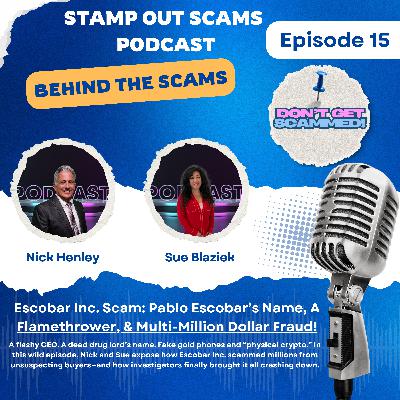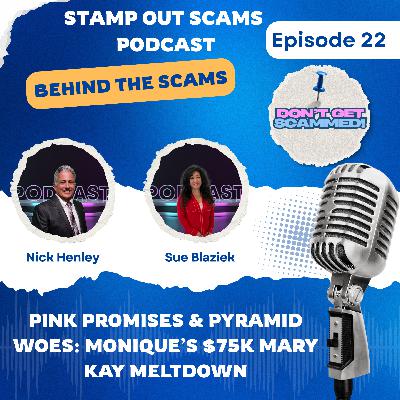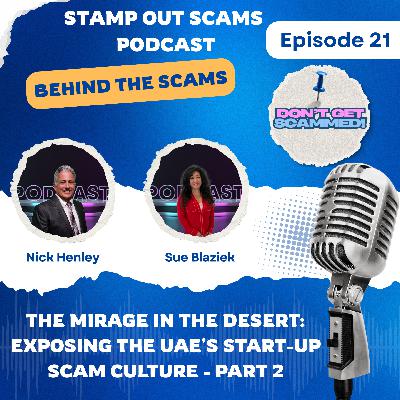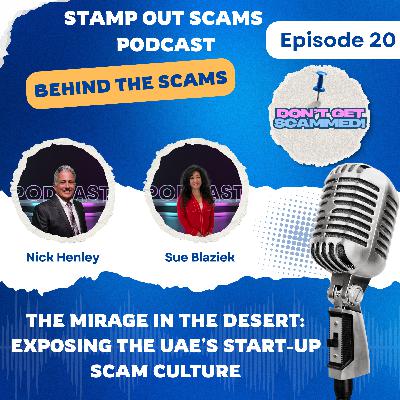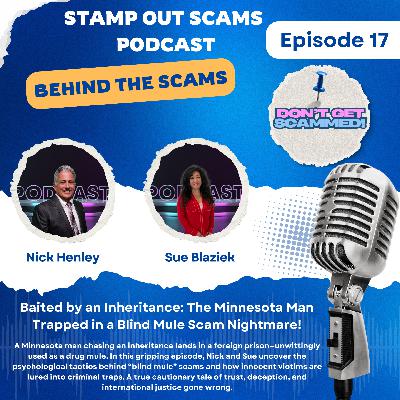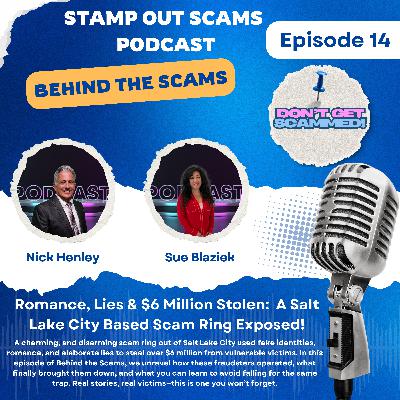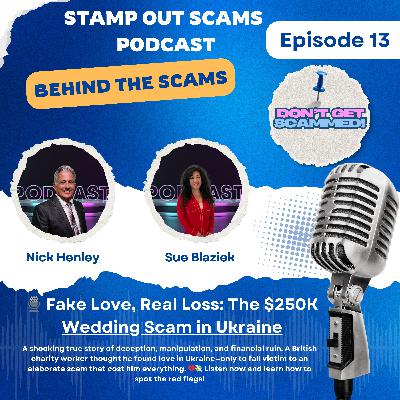EP15: Escobar Inc. Scam: Pablo Escobar’s Name, A Flamethrower, & Multi-Million Dollar Fraud
Description
A Deep Dive Into the Mind-Bending Scam That Used a Drug Lord’s Legacy to Fuel an International Fraud Operation
Behind the Brand: The Wild World of Escobar Inc.
In this jaw-dropping episode of Behind the Scams, hosts Nick and Sue expose one of the most audacious scams in recent memory—an international fraud ring that used the name and likeness of the infamous drug lord Pablo Escobar to market fake products like flamethrowers, gold-covered smartphones, and even “physical cryptocurrency.” It’s the kind of case you truly have to hear to believe, with layers of deceit, big money, and global intrigue.
The story centers on Olaf Kyros Gustafsson, a Swedish national and self-styled entrepreneur who called himself “Sir Olaf” and, more flamboyantly, “El Silencio.” He wasn’t silent when it came to marketing—but he certainly was when it came to delivering on promises. As CEO of Escobar Inc., Gustafsson claimed to hold the rights to Pablo Escobar’s name and legacy, launching a slick branding campaign that offered extravagant, too-good-to-be-true products at irresistible prices.
A Masterclass in Deception
Rather than creating legitimate items, Escobar Inc. created elaborate product campaigns based on celebrity impersonation scams, trust-based marketing, and social manipulation. Gustafsson took existing high-end products—like Samsung’s Galaxy Fold phone—and rebranded them as “Escobar Fold” devices. He even wrapped a few actual Samsung phones in gold foil and sent them to YouTube influencers, who unknowingly praised the scam products in glowing video reviews.
With influencer credibility secured, Gustafsson launched full product campaigns, offering foldable smartphones at unheard-of prices—$349 instead of the typical $2,000 retail tag. Thousands of eager consumers placed orders, believing they’d found the deal of the century. What they received instead? A cheap certificate claiming “ownership” of the product. No phone. No flamethrower. Just a receipt and a disappearing act.
The Power of Influence and Illusion
What made this scam so effective was the clever use of malvertising tactics, social proof, and faux legitimacy. Escobar Inc. rode the wave of viral interest using shock value—who wouldn’t pause when offered a flamethrower endorsed by the Escobar name? Or a gold-plated iPhone “previously banned in the U.S.”? Add a few trusted tech reviewers to the mix, and suddenly a scam looks a lot like a startup.
Nick and Sue guide listeners through the twisted trail of misinformation, carefully showing how scammers used bold claims and digital sleight of hand to con buyers out of millions of dollars across PayPal, Stripe, Coinbase, and wire transfers. The scam not only preyed on people’s desire for good deals—it weaponized brand loyalty and digital trust to pull off one of the most deceptive online operations ever prosecuted.
A Physical Cryptocurrency—Because Why Not?
If smartphones and flamethrowers weren’t wild enough, Escobar Inc. introduced “Escobar Cash,” advertised as the world’s first “physical cryptocurrency.” Of course, this product didn’t exist. But with professional-looking websites, slick product pages, and emotionally driven marketing, customers eagerly handed over real money for fake currency in coin form that never shipped. Gustafsson’s team had perfected the scam model: fabricate a trending product, undercut the market price, collect the money, and send a meaningless certificate as proof of delivery. All while basing their business model on Pablo Escobar.
Money Laundering in Motion
Where did the millions that were generated by stealing the name of Pablo Escobar go? The podcast uncovers how Gustafsson laundered funds across the globe, using complex banking structures, shell companies, and international cryptocurrency transfers to cover his tracks. Money flowed through accounts in Sweden, the U.S., the United Arab Emirates, and even offshore jurisdictions. Every dollar paid for a non-existent phone or piece of “Escobar Cash” was quickly buried in a maze of international financial transactions.
With Sue asking the smart questions and Nick drawing on his 25+ years of experience as a former federal agent and Certified Fraud Specialist, listeners get a behind-the-scenes look at how financial crime is uncovered—from undercover investigations to digital forensics and international asset tracing.
The Role of Crypto and the Unexpected Twist
Ironically, the very tools Gustafsson relied on to hide his tracks—cryptocurrency and blockchain transactions—were part of his downfall. While many people believe crypto is anonymous, investigators followed the blockchain breadcrumb trail to expose the fraud. That twist adds a poetic layer to the story, and highlights a major theme of the episode: even the most sophisticated scams have flaws that determined investigators can find.
What Makes This Scam So Dangerous
The Escobar Inc. scheme is more than just an online product hoax. It exemplifies the growing threat of digital scams and influencer fraud, where social media hype can rapidly legitimize fake businesses. It also taps into broader fears about cryptocurrency scams, identity theft, and e-commerce fraud—a troubling sign of how easily digital trust can be manipulated.
Nick and Sue emphasize that anyone can fall for these schemes. Victims ranged from average consumers to business professionals and tech enthusiasts. The common thread? Each was lured in by a false sense of legitimacy and urgency, a tactic that scammers have used for generations—only now it’s faster and reaches farther thanks to global connectivity.
When Law Enforcement Fights Back
This episode celebrates the resilience of law enforcement teams, including IRS Criminal Investigation and the FBI, who used surveillance, financial forensics, and undercover operations to break the case open. The podcast dives into the investigation, revealing how agents documented fraudulent purchases and traced international wire transfers with precision. These efforts ultimately led to Gustafsson’s federal indictment, which includes over 100 counts of wire fraud, mail fraud, money laundering, and conspiracy.
Scam Lessons From Escobar Inc.
Listeners walk away from this episode with tangible takeaways. Nick and Sue break down the warning signs of celebrity scams, the dangers of online-only purchases from unknown companies, and why price slashing should always raise red flags. They explain how scammers exploit emotional impulses and tech buzzwords to generate viral appeal—like labeling a rewrapped phone as “revolutionary” or inventing the term “physical cryptocurrency” just to cash in on hype.
They also stress that digital literacy and scam awareness must evolve alongside technology. It’s not enough to be suspicious—we need to be vigilant, educated, and proactive. Platforms, influencers, and consumers all share responsibility in creating a safer digital marketplace.
Why This Story Matters Now
In a time when fraud is more sophisticated than ever, the Escobar Inc. case is a cautionary tale with global implications. It shows how branding, digital tools, and global banking systems can be hijacked to orchestrate massive scams—and why fraud prevention education must be part of everyday digital life. The podcast is not just a story; it’s a warning, a guide, and a reminder that no scam is too outrageous to be real. Even the theft and use of a late drug cartel drug leader named Pablo Escobar was out-of-bounds.
Tune In
Nick and Sue only scratch the surface in this blog post summary. The full podcast episode takes listeners deep into the psychology, methods, and aftermath of one of the most bizarre and expensive scams of the last decade. With expert analysis, real-world examples, and a touch of humor, Behind the Scams brings scam prevention to life in a way that’s both eye-opening and unforgettable.
Scam Prevention Starts with Awareness
Visit our website, www.stampoutscams.org, regularly for real scam stories, free educational tools, scam news and updated alerts on how to spot and avoid financial fraud and scams. You can listen to our full podcast episodes here and on our YouTube channel, ScamTV.
Our full podcast episodes can also be found on:
Amazon, Apple Podcasts, CastBox, Deezer, Pandora, Player.fm, PocketCasts, Podchaser, Spotify, YouTube, iHeartRadio.
Stay connected for more insights into text message phishing, cryptocurrency scams, online dating fraud, and identity theft prevention—all through th

